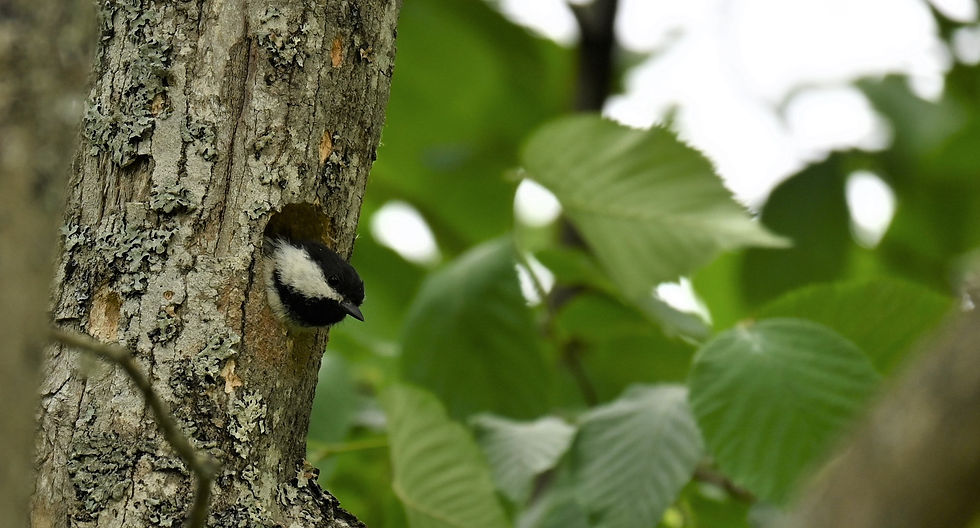Notes on a Chickadee Family
- aimeecreedunn
- Jun 20, 2022
- 2 min read

Last month a neighbor tipped us off to a chickadee couple excavating nesting sites in a small dead tree nearby. It turns out, chickadee couples will excavate several sites before settling on one to build a nest and lay eggs.
It's been a little while since then, but just this weekend a chickadee near that tree started sounding an alarm call when my cat wandered too close for comfort. Safely scooping the beloved feline to a place safer for the chickadees, I came back a few minutes later and watched as one of the chickadee parents hopped from tree to tree, food in beak. The route was circuitous, but after some careful observation I finally spotted a chickadee head peeking out of a cozy hole in a dead tree surrounding by fluttering maple leaves from nearby trees.
Primarily monogamous with bonds between couples that can last at least several years, the father feeds the mother both while she incubates the eggs and after the eggs have hatched. I've only watched them here and there over the last couple of days since discovering their nesting site, but in that limited time there has been much of interest to see.
For one, the father (I'm assuming I was watching the two parents) brings a variety of food. I observed him arriving with live critters from grubs to worms. Each time the father brought food, the mother disappeared into the nest with the food only to return, empty-beaked, to peer out of the nest-hole a few moments later. Just this morning I watched as the father flew away after a food delivery and evidently took a little too long returning with more food. The mother, peering as usual from the excavated nesting hole, started to look a little anxious than uttered the softest of "phoebe" calls. I left a few moments later in case I was the reason for his delayed return.
Yesterday, having set up my tripod on the road, I was filming for about a quarter of an hour. Feeling this pushed the limit in terms of stress and safety for the chickadees, I turned around to gather my camera equipment. One of our local forest hawks circled nearby. Turning my camera on this new subject, the hawk disappeared quickly, but it served as a good warning. Predators watch the patterns in their home territory. Unusual and riveted attention like what I was giving the chickadees could put them in danger.
Given that, as badly as I want to return and spend hours watching this little family, I'll content myself with the footage I already have with only the very surreptitious, very occasional peek now and then as I head off for a casual stroll down the dirt road.



Comments